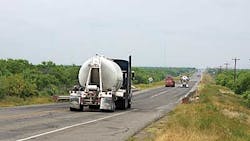Industry has to let go of archaic ideas and develop a bold plan to deal with truck driver shortage, Voorhees says
THE tank-truck industry has to take responsibility for the driver-shortage issue and make fundamental changes in the way it approaches hiring, according to Neil Voorhees, director of safety and security for Trimac Transportation.
“We have to let go of some of our old ideas, especially when it comes to recruiting and retention of our drivers, because something has to change,” he said. “We have to figure out how. I see the military going after people hook, line, and sinker — advertisements, video games. Do you see any of that for the trucking industry? We have to stop talking about it and do something about it. We've got to stop hiding behind this. It's us.
“Has anyboSome of their observations:
Voorhees: “I think automatic transmissions are huge, but who's bragging about it? These tractor-trailer rigs that individuals drive now are more like Winnebagos than trucks. They're very comfortable, and they have computers in them. We're high-tech but we don't talk about that. We've got to change.”
Voorhees: “It's not an unskilled job. I hear that all time. We have to market the fact that this is a skilled job. First, we have to start advertising. The trucking industry needs help in developing a better marketing strategy. You ride along with one of my truck drivers, and you can see he is darned skilled — and that includes everything he does, from loading to unloading. I couldn't do half the stuff these men and women do, but we don't brag about it. We've got to be proud of being in trucking. It's one of the best jobs going.”
Voorhees: “It's a career. There are so much opportunities in trucking today. You don't have to be a truck driver your whole life. There's a lot of promotion opportunity from within, but we don't sell it.”
Voorhees: “We have to look at people who maybe have never been in a truck in their life, and spend money to make them truck drivers. We've got to stop giving this lip service. It's time for action now.”
Debolt: “Where is the highest unemployment rate among younger people? Recent college graduates stand out as a group. Why are we not going after them? Why are we not putting them through an extensive training program using a tool like predictive modeling or personality profiling to identify that young entry driver or even old entry driver, identifying those traits that are conducive to a safe, honest, loyal person?”
Voorhees: “Boy Scouts have a transportation badge program. We could get involved with that.”
An audience member said his company got involved with a Vo-Tech, taking a tractor and trailer and what it considered its “most personal, communicative driver” to that school for a week. From that, the company developed a training program to satisfy the 10 interested applicants and is investing money in an apprentice program.
Voorhees: “We're working them too many hours. Drivers don't want to work 70 hours a week for $12 hour.”
After an audience member said that many young drivers are leaving the industry because they spend wasted hours at a loading rack, shippers and consignees are “cut-throat,” and the business has become “dirtier,” Voorhees said: “It's our fault. We've allowed it to happen. As a young man or woman, I would have doubts about getting into the trucking industry if I had to put up with that crap. We're almost to the point where we can auction drivers, tractors, and trailers for the highest rates. Who wants to pay the most for it? There are not enough drivers, tractors, and trailers to take care of all this business. Maybe it's time we told our shippers and consignees, ‘I've got you a perfectly trained driver dressed in a nice uniform and operating this expensive tractor and trailer. What are you willing to bid for it?’”
Voorhees: “Ever see a Freightliner or KW simulator in a mall? Why don't we do something like that? Kids would pay to drive a truck. But we're not doing it.”
Debolt: “We're the only people who can help ourselves. We have to convince Great West Casualty that the people we're putting through a training program are not only competent but are confident and have the traits that will make them a safe operator, not only of a general tractor-trailer but one handling hazardous material.” ♦
About the Author
Rick Weber
Associate Editor
Rick Weber has been an associate editor for Trailer/Body Builders since February 2000. A national award-winning sportswriter, he covered the Miami Dolphins for the Fort Myers News-Press following service with publications in California and Australia. He is a graduate of Penn State University.

